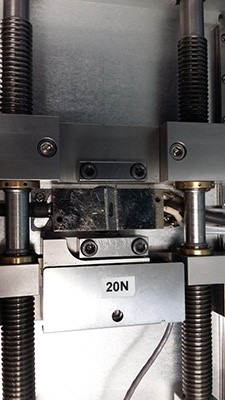Market leaders in temperature controlled microscopy, Linkam Scientific Instruments report on the use of their tensile temperature controlled stage is being applied to develop and characterise novel materials that address the growing burden of eye healthcare in an ageing population.

This work is being carried out at the University of Liverpool in the research group of Professor Rachel Williams.
Professor Rachel Williams is Professor of Ophthalmic Engineering at the Institute of Ageing and Chronic Disease at the University of Liverpool. Her expertise lies particularly in the design and characterisation of the bulk and surface properties of materials and how to modify them to optimise the properties for specific applications.
The major aim of her research group is to develop advanced materials to address the growing burden of eye healthcare in the ageing population. Underpinning these developments is the design and production of advanced materials with key features that drive the biological response required to overcome the destructive nature of the disease. Two particular areas where the Linkam system is applied are in: 1) the design and development of novel materials for contact lenses and 2) the design of advanced gels to replace damaged corneas.
The motivation for incorporating such a stage in the workflow of this research comes from the ability to characterise the mechanical behaviour of gels. A high water content transparent gel can be produced from poly-ε-lysine and cross-linked with multifunctional carboxylic acids.
With the Linkam TST stage, we have shown that mechanical properties can be controlled by the nature and density of the cross-links to produce a gel with properties similar to existing contact lenses.
Prof Williams - University of Liverpool
Development of these gels as contact lens materials will underpin the development of a new generation of infection resistant contact lenses. The benign nature of the cross-linking reaction of the poly-ε-lysine gels provides an opportunity to incorporate antibiotics into the gels during, or after, synthesis for subsequent release onto the cornea. The characteristics of the cross-linked gel in terms of chemistry and density are being designed to control the drug release rate to provide a therapeutic delivery to treat corneal ulcers.
The second part of the programme is to design and develop the platform of gel-like materials for the production of a tissue equivalent for complete corneal replacement. Conventionally, corneal diseases have been treated with full thickness corneal transplantation but there is a chronic shortage of cornea available for transplantation. There would be significant advantages from the development of a synthetic tissue equivalent. The tissue equivalent needs to be transparent, strong and supportive of keratocytes to mimic properties of the native corneal stroma.
The surfaces of the gels need to promote the attachment and growth of corneal epithelium and endothelium each of which grow on a defined basement membranes. Once again, the group is using the Linkam system to optimise the properties of these gels.
Talking about the advantages of using the Linkam TST stage, Professor Williams continued, “While temperature control is not important for our research, the benefit of using the Linkam stage is that our samples are very small and difficult to handle. It would not be possible to test them in a vertical system whereas the horizontal stage of the Linkam system works well for us. The small scale of the whole stage also means it can be put inside a cell culture incubator if necessary.”
To learn more about Linkam and their approach to the development of new techniques based on temperature stages to address multiple applications challenges, please visit www.linkam.co.uk.